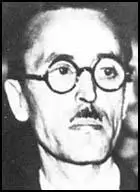Segismundo Casado

Segismundo Casado was born in Spain in 1893. He joined the Spanish Army and by 1936 had reached the rank of major and was in charge of the military household of President Manuel Azaña.
After the outbreak of the Spanish Civil War Casado helped to develop the tactics of the Republican Army in central Spain. In 1938 he was promoted to colonel and given command of the Republican troops in the central zone.
In August 1938 President Manuel Azaña attempted to oust the prime minister, Juan Negrin. However, he no longer had the power he once had and with the support of the communists in the government and armed forces, Negrin was able to survive.
On 27th February, 1939, the British prime minister, Neville Chamberlain recognized the Nationalist government headed by General Francisco Franco. Later that day Manuel Azaña resigned from office, declaring that the war was lost and that he did not want Spaniards to make anymore useless sacrifices.
Juan Negrin now promoted communist leaders such as Antonio Cordon, Juan Modesto and Enrique Lister to senior posts in the army. Casado now became convinced that Negrin was planning a communist coup. On 4th March, Casado, with the support of the socialist leader, Julián Besteiro and disillusioned anarchist leaders, established an anti-Negrin National Defence Junta.
On 6th March José Miaja in Madrid joined the rebellion by ordering the arrests of Communists in the city. Negrin, about to leave for France, ordered Luis Barceló, commander of the First Corps of the Army of the Centre, to try and regain control of the capital. His troops entered Madrid and there was fierce fighting for several days in the city. Anarchists troops led by Cipriano Mera, managed to defeat the First Corps and Barceló was captured and executed. It is estimated that 230 people were killed during this internal conflict.
Casado now tried to negotiate a peace settlement with General Francisco Franco. However, he refused demanding an unconditional surrender. Members of the Republican Army still left alive, were no longer willing to fight and the Nationalist Army entered Madrid virtually unopposed on 27th March.
Casado went to Valencia where he boarded an English ship at the end of March. He lived in Britain for many years and did not return to Spain until just before his death in 1968.

